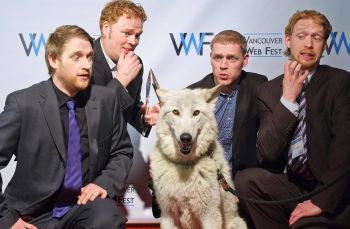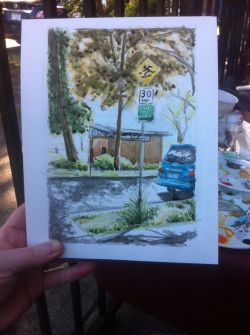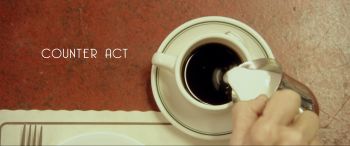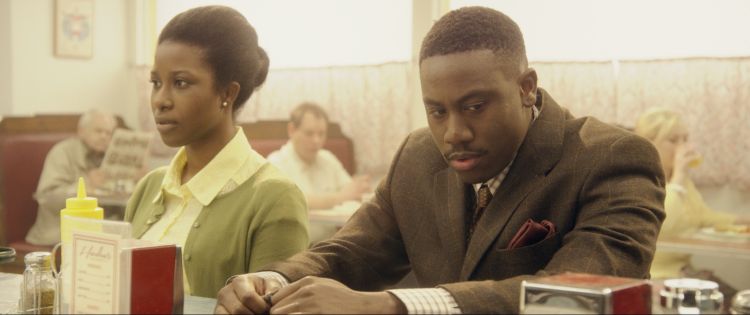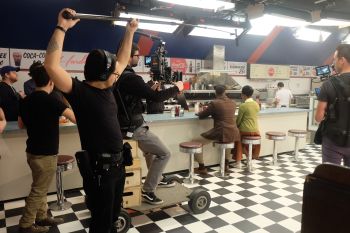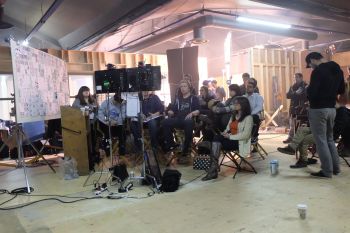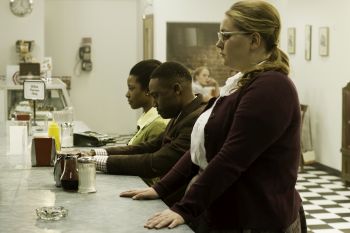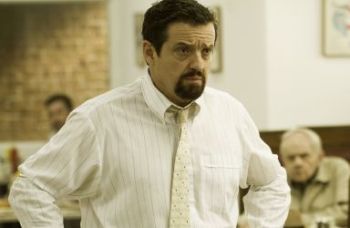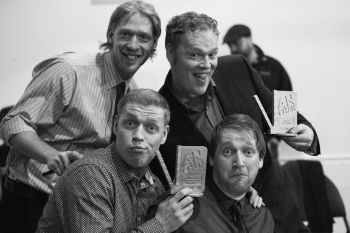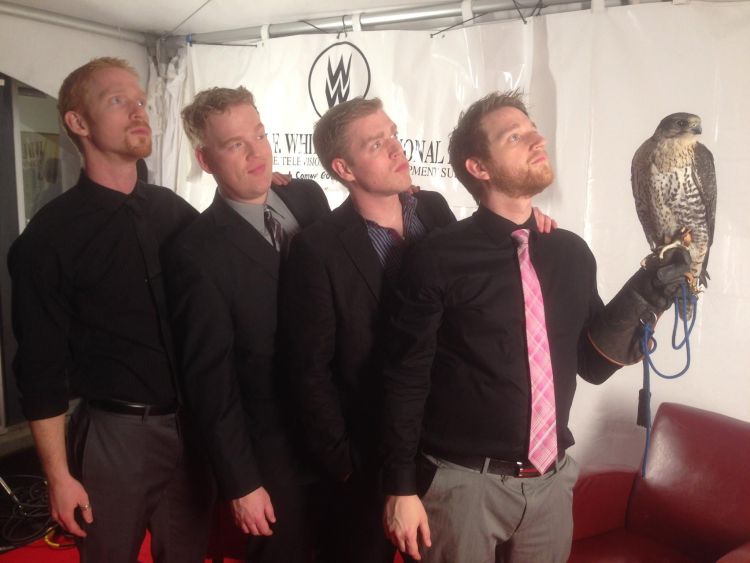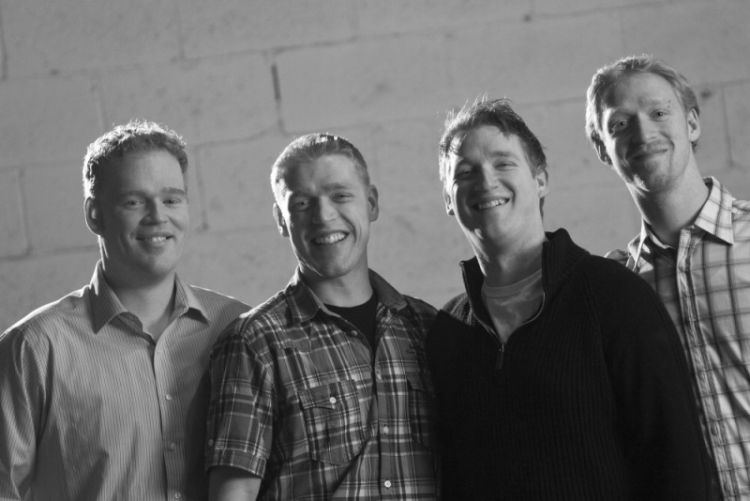
From the Foreshadow Films website:
Working together since before they called it work, the Affolter Brothers have dedicated themselves to telling unique, compelling stories, from light-hearted comedies to heavy dramas and everything in between. In 2006, the four brothers founded Foreshadow Films (formerly Affolter Entertainment), a Vancouver-based production company focusing on original content for film, TV and the web.
Collaboration is key among the brothers. They share the writer, producer and director credit on all of their projects, and they pride themselves on creating a family atmosphere on every one of their film sets. Since the company’s inception, the brothers’ films, commercials and music videos have played in dozens of film festivals worldwide and have won or been nominated for over 40 awards.
The Affolter Brothers made the short film Counter Act which features Louis Ferreira. They joined The Friends of Louis Ferreira in May 2016 with an exclusive interview, which you can read below.
For individual filmographies of the four brothers please check out their individual listings:


AN INTERVIEW WITH THE AFFOLTER BROTHERS
Here’s Louis with a short introduction:
LF – Folks, meet the Affolter Brothers! I had the pleasure of working with these four brothers who get along, who can teach us all a lesson about brotherly love as they work together, in a very complex business, seamlessly. They were the winners of a Short contest and then I had the privilege of being part of their Short that won that contest.
And I can’t say enough about seeing these young men, not only work together, but how they execute and how respectful they are, and inclusive they are, and all the things that we should be with each other.
They’re just these beautiful spirits that I’ve been blessed to have encountered along my journey, so enjoy, because I certainly did, working with them.
And so, without much further ado, here is the interview with Nathan, Jon, Heath and Thomas Affolter. Listen to the sound file here:
FF – Hi everybody, this is Bea from Ferreira Fest and I’m so thrilled to be talking to the Affolter Brothers tonight. They made the short movie Counter Act that Louis was in a little while ago and that we’re about to see very soon.
So anyways, hi, and, who are the Affolter Brothers? And what is it you do? What gets you up in the morning?
NA – Hello!
JA – Hello!
NA – Hello, how’s it going? I’m Nathan Affolter. I’m the oldest brother, I’m trained in animation as well. We all kind of collaborate on animation and live action.
JA – And I’m Jonathan, I’m the second oldest, also trained in classical animation.
HA – I’m Heath. My training is all in live action.
TA – Yeah, and I’m Thomas. I’m the youngest. I’m the baby of the family. Proudly the babe. And I’m also trained in live action.
We all work together and we love writing and developing stories, themes, characters, things that we’re passionate about. Then, if we can, whenever we can find financing for the project, ultimately producing and directing together as well.
Because, well, quite frankly we produce our best work when we’re all working together, and we’re all on the same creative wavelength but we all have strengths and weaknesses, we all bring something different to the table.
So we find that the more minds on a topic, the better the end result is.
FF – Fantastic.
HA – We have a production company together called Affolter Entertainment (now Foreshadow Films), and that’s what we do. We do short films and music videos and commercials, web-series and we’re working towards doing our first feature.
FF – Okay, and who’s the water-color artist?
NA – Oh, that’s me, Nathan.
FF – That’s Nathan, okay, because I saw the picture on Twitter today and I was like, damn, that’s good. So, very multi-talented there.
HA – Thanks. Both Jon and Nathan are extremely talented artists.
TA – Both Heath and I are extremely not talented!
FF – Again, perfect match, right? All right, well, if somebody could tell us a little bit about Counter Act and maybe about the story of the movie. What’s the plot?
HA – Well, Counter Act is a short drama, it takes place in a Tennessee diner circa 1960. And it’s about a young woman named Alice who witnesses a sit-in protest happening at the diner that she’s in, by two young African Americans named Mary and Ray, and she somewhat naively decides to get involved and join them in their protest.
But that kind of raises the ire and anger of the racist patrons. And she soon gets in over her head.
But eventually through the example set by the sit-inners, she learns to stand up for what she believes in.
FF – Great! How did you come up with that idea? With the storyline, even wanting to make a movie about this particular topic?
HA – Yeah, originally it started about five years ago or so when the last short film that we had in film festivals was playing at the Santa Cruz film festival, and one of the films playing there was a documentary called Soundtrack for a Revolution.
And part of that documentary is about the Civil Rights movement and the music within it, and they showed some clips of sit-in protests that were happening, like old news footage.
And we just found it incredibly inspiring, and a really amazing story.
We actually hadn’t even heard of the sit-in movement prior to that and the more we researched it the more we thought that was just a travesty that not only us but a lot of people in our generation didn’t even know that that took place.
We knew about the Civil Rights movement but you hear mostly about the Martin Luther Kings and the Malcolm Xs and the real leaders of the Civil Rights movement, but you don’t hear so much about the everyday Joes who really took it upon themselves to get out there and do whatever they could, and they were such a massive part of the movement, and we just found that really inspiring and we wanted to tell a story about that.
HA – But in doing our research about it we struggled with, a little while, with how to tell the story, because of the fact that we’re Canadian and we’re white and we’re not exactly directly tied to the movement in any way. Which kind of stalled us a little bit of being like why should we tell this story or why do we deserve to tell such a great story. And it was through that lens that we found our particular story which is about a white girl named Alice who witnesses it all happening and decides to get involved. We found our personal connection to it because of the fact that even if you are an outsider who’s passionate about it, even if you’re not the one who’s actually being persecuted, doesn’t exonerate you from getting involved and for standing up for what’s right.
FF – Right. Exactly. So that was your personal connection, your hook into that particular part of history.
HA – Yeah, exactly.
FF – Now how did you end up casting Louis in the movie? How did that come about?
NA – We’re lucky that we got part of the Hot Shot Shorts Competition which was a script to screen competition here in Vancouver. Part of that sponsorship includes a casting director named Maureen Webb. She’s great, she’s an awesome person, it was just a treat to get to work with her.
She’s legendary in town, and everywhere. And, yeah, so she helped cast the film and got us in connection with Louis I believe, didn’t she?
TA – Yeah, yeah.
HA – We really couldn’t have done it without Maureen’s casting, she has worked with Louis before. She’s the one that got in contact with him, gave him the script, stuff like that.
TA – Absolutely. Maureen’s the best, for sure. Project Limelight, too, is very worthwhile. All that work she’s doing, she’s definitely one to give back. We were one of the lucky recipients of that.
FF – Great.
TA – She’s out of our range, normally. We were fortunate to get to work with her.
JA – At first we thought it was kind of a long shot, we didn’t know [Louis] personally, had never worked with him before. But we love his work, had seen him in feature films and television. And we’re just huge fans, so we were looking for somebody to play Jimmy, the manager and owner of the diner. So we contacted him and he read the script and loved it and wanted to get involved and contacted us and that’s how it just came to be that he was part of the project, and we were so lucky to have him.

Photo by Amanda Oakes
Louis brought so much, with his experience and just his personality, he’s such a great guy to work with.
And he was on set, I think that all the younger actors, too, looked up to him and learned a lot from his technique, from his methods, and just the way he is on set. He puts everybody at ease but at the same time can turn it on.
And when the camera’s rolling and it’s time to do his job he’s very professional that way.
FF – Do you have a memory of the filming that you’d like to share? Something that surprised you, maybe a discovery that you made, as you made the movie? As you were actually working on set?
TA – You know what, there are so many stories to choose from. It’s hard to narrow it down to just one thing in particular and we’re kind of fortunate, too. Normally a lot of big stories come out of stuff going completely haywire or sideways or breaking down.
But we were actually, we were fortunate, we had a pretty smooth shoot. It kind of all went according to plan.
I think definitely one of the most lasting impressions or memories that all of us took away from it was just the level of respect and comfort that everyone brought to it as well as their passion and hard work.
But, we start every day of our productions, we have a little thing that us four brothers do, where every project we have, every day after the safety meeting we start with a big huddle. Like a team huddle, so everyone, all the cast and crew we all get around and put our arms around each other and have a little pep talk. And we like to treat everyone like a big family, basically. I mean, we are a big family, that’s where our background is.
FF – Right.
TA – So we have to tell people we’re not just coworkers, we’re not just all members of a team, we’re all a big family, and each and every day that we work together that’s how we’ve got to treat each other, with love, dignity and respect.
TA – And especially for a project like this where, not only for Louis but for all the performers, in particular Naika Toussaint and J. Alex Brinson who play the sit-in characters, and Teal Fiddler, for that matter, who played Alice, our lead character. It’s not easy content to do, the nature of the story is quite heavy and any time you dabble in racism and prejudice you’re entering into a dark area, a dark aspect of human nature. And it’s important for performers of any creative practice, but especially for actors on a film set, to be able to feel comfortable.
And to just feel like everyone’s there to support them, and everyone is there to help them out. And that they’re allowed to go to those places, and to have no fear of doing so. We really felt like our crew, all of the cast members as well, but especially the crew, they all, the below the line crew members, every person just brought such a level of respect and decency to it and we really felt like it was a big family out there.
We were super honored and super humbled and just unbelievably grateful for the level of passion and love that all the members of the family brought.
FF – That’s wonderful.
HA – Louis in particular, I think, it’s not necessarily one particular memory, but he’s just such a veteran that he really became a leader for everybody on set, especially the cast, because we had a lot of young up and coming cast in this and every time he stepped on the set it just made everything so light and fun and people could turn to him and he always, he had some pointers for people, but as well just would always be making jokes and saying things that would keep the crew and the cast just feeling positive throughout the entire experience.
FF – Right, and that’s so important, especially when you’re dealing with a heavy subject. You need a little bit of levity here and there.
TA – Absolutely.
TA – Yeah, and there was a point, we found out that Louis, he was still doing Motive while we shot this short film. Normally the way Motive works is like a Monday through Friday shoot, they don’t shoot on weekends. But we found out like, what was it, a day or two before we were about to shoot that Louis had just gotten word that that particular episode of Motive that they were shooting needed to shoot on the Saturday, and our production was a Saturday/ Sunday shoot.
There was a time where Louis called us up and [said], I’m due on Motive so I won’t be able to get to set until later in the evening. And is it even going to be possible to be a part of the project. And he really wanted to but he was worried about being a hindrance to us, the team making, the production team and we just said, no, you know what, we’ll figure it out with the schedule. We’ll figure it out, and the way it ended up working was that we started Saturday morning and probably worked for, I don’t know, seven, eight, nine hours before Louis even got to set that day.
So he had actually done two productions; he had done a full day on Motive, then came all the way out to Maple Ridge, which is outside of Vancouver, so it’s a bit of a drive out to our set. He came all the way out there to our little production, our little Indie short film, coming from this big hit TV series, and for everyone on set he was like a spark plug. As soon as he got there everyone was just elevated by him. And as Heath mentioned that the humor that he brings, he’s making everyone laugh, making jokes, just having a great time and just really brought this incredible energy.
I remember thinking, myself, that I was pretty blown away that this guy who’s, you know it’s not like he’s a twenty year-old or anything. He’s a veteran actor now but he still has this incredible energy where he can do two completely different productions, plus travel time, in the same day, and still just set the standard for the level of energy and passion that’s there on set. It was really an amazing thing.
HA – And on top of that he worked the entire Sunday for us and then on Monday had to go back to Motive. So we were extremely grateful just that he was willing to put in that time for a little Indie that wasn’t paying him anything.
TA – Dedication, truly.
FF – What’s next in the development of this project? Where are you with the movie at this point and when can we expect to actually catch a glimpse of it?
NA – We’re currently sending it out to film festivals right now. So we’ll be doing that for about the next year. It will play at some of them, hopefully. You’ll be able to keep track of that on our website, and our Facebook and Twitter.
After the film festivals, we really want people to see this film, just to spread the word. So we’ll be figuring out the next avenue, whether it’s online, and what avenue that online is basically.
FF – Fantastic. How can our readers and Ferreira Fest members help? Where can we contribute? Is there a way we can contribute, how can we help promote the movie?
TA – Well, for right now we dabbled with potentially doing a crowd funding campaign, to raise some money to help with film festival entries, shipping and distribution costs that way.
But we haven’t quite landed on that yet so we don’t have that going. If we do start something like that we’ll obviously be in touch with you and let you know about that and hopefully you can put the word out to your readers and your listeners, that would be amazing if it comes to that.
But we’ve got a couple other avenues to explore first for additional financing to help with the distribution costs, so for right now it would just be great if everyone could look us up online.
We’re just about to launch the website, the Facebook page, the Twitter, and the Instagram, all the social sort of thing for the short film Counter Act and if people could look us up, google us or whatever or search us on Facebook and all that then it would be a great help, just to have people like and subscribe.
Stay in the loop and as news and updates occur, as we have exciting stuff to announce, then if they can just share it on their own Facebook and spread it around and tell anyone and everyone that they think might be interested in the project, or something like this that they should check it out.
Basically the more, the larger the following the better our chances are of getting into the film festivals where we’re actually going to end up playing and get this film in front of some audiences.
FF – Absolutely, well we can certainly do that. What’s your next big project? I mean, you’re still very much involved in this one but what’s on the horizon?
TA – Well, this one’s kind of winding down actually, so now our attention is, now that it’s completed it’s basically just the film festival marketing angle for Counter Act. Our next big production is, [we] haven’t fully decided yet. The way we work is, we often end up pitching television series ideas or feature film concepts to bigger studios and networks and the people that have the money and the financing to make these things become a reality. So, a couple ideas for some feature films, we’ve got a lot of ideas for television series ideas and not just the dramatic historical content, but lots of stuff. We’re heavy into, as we mentioned earlier, animation, and have a lot of ideas for kid shows and comedies and lots of fun stuff.
We’re hoping that Counter Act opens some doors with regards to the bigger projects for us.
JA – We also have a YouTube channel called Comedy Blender which you can check out. We have tons of different web-series on there, a few different ones, a different variety, some animation, some live action, a mix, you know, hybrids of both. Just a lot of fun stuff that’s all kind of just experimental and just to keep our tools sharp and keep entertaining people and trying out different styles and different types of comedies and film making and get our name out there and show people what we can do.
FF – Something for everybody then.
JA – Yeah.
FF – Quite literally. Thank you so much for being with us this evening and thanks for all the information and we hope to hear and see a lot of you guys in the very near future.
TA – Well thank you, and [we] really appreciate it.
TA – It’s an honor to be interviewed by you. It’s an absolute pleasure. Thanks be to you for sure.
FF – Well, thanks so much for your time. We’ll talk to you soon.
HA – Take care.
FF – Okay, bye!
Thanks to Casey for the transcript. All photos courtesy of Foreshadow Films; used with permission.
Watch the trailer for COUNTER ACT right here!

THE UNDERTAKER’S SON
This interview focuses on the latest short film by the Affolter Brothers, The Undertaker’s Son. Louis plays the part of the undertaker, Johnathan Redding.
Watch the Teaser Trailer here.
Two of the Affolter Brothers were kind enough to do an interview with Ferreira Fest. Here we go!
FF – Welcome back to the Affolter Brothers, we are so thrilled to talk to you again. And, who do we have on the line today?
HA – This is Heath Affolter.
TA – And Thomas Affolter.
FF – Well, welcome Heath and Thomas!
HA – Thank you very much, we’re happy to talk to you again, it’s always a pleasure.
FF – Great! So, you’ve been incredibly busy in this past year since we last talked. Could you hit some of the highlights of what you’ve been doing?
TA – Yeah, absolutely. We’re right in the middle of doing one short film that last fall we put together a little pitch campaign, basically, to try and win some financing to do. It’s a stop motion animated short film that’s being produced as part of the Telus Storyhive system, up here, a system of financing. And so basically this company Telus, who’s a communications company up here in British Columbia gives grants out to emerging filmmakers to make products, whether they’re, sometimes they’re music videos, sometimes they’re short films, sometimes web-series, they do a bunch of different versions of the Storyhive project. And this version was an animation go around of things, and we’ve done some animation in the past.
Two of us brothers, Nathan and Jon, were actually trained in animation, and Heath and I are trained in live action, so… we’ve done a lot of stop motion animation in the past as well which is like the Wallace and Gromits, or Nightmare Before Christmas, that’s that style of animation, so we pitched a project called Soggy Flakes as a stop motion animated short film and then put together a little campaign to try and get everyone we know to vote for it, basically. And we were very fortunate to win one of the ten thousand dollar grants to make it, so now we’re literally filming it in the next room while we’re on the phone with you.
FF – Well that’s wonderful! Yeah, you’ve posted some pictures of the puppets that you’ve built for it and so we’ve been following it on Instagram and whatnot, and it looks great!
HA – Thank you, yeah, we’re pretty excited about it.
HA – And then we’ve also been, over the last year or so, our last film with Louis, Counter Act, has been playing at some film festivals around the world. So we premiered at the Edmonton International Film Festival, where we won the rising star director award. And then we went on to play at the Reelworld Festival in Toronto where we won the audience award for best short film. And then since then we’ve played at festivals in Vancouver, Port Moody, Maple Ridge, Jackson, Mississippi, we’re at the Victoria, Texas Independent Film Festival this weekend, as well as the Crossroads Film Festival, I think that one’s the one in Jackson. Oh, and the Omaha Film Festival as well.
On top of all of that we also got some financing earlier this year as part of the Crazy8s contest which is a pretty big contest that happens in Vancouver here every year where they select six short films to be made through a pitching process. You start with a video pitch, and then you do a live action pitch, then they narrow it down and you submit a script, and they kind of keep narrowing it down in these stages.
And they end up picking six films to make. And so we were chosen as one. So the film we made is called The Undertaker’s Son. And we were fortunate enough to be able to work with Louis Ferreira again on that one. He was able to star for us this time.
FF – Wonderful. So, let’s talk about The Undertaker’s Son since we’ve already segued into that. So, like Counter Act, it’s actually quite a departure from Comedy Blender and the cartoon characters that we’ve just talked about. Why do a Western, in this day and age?
TA – Well, we’ve always wanted to do a Western of some form. We’re big fans of the genre, you know, grew up on all the Clint Eastwood pictures and Sergio Leone, you know, Once Upon a Time in the West, and all these wonderful classic films.
FF – Right.
TA – And John Ford, and all these inspiring films from cinema history that are sort of staples in the Western genre. And we always thought that would be a really fun genre to dabble in, to sort of dip our toes into.
TA – And so we came up with this idea of basically looking at a Western that takes place after other Westerns do. That is, in a normal Western you see a lot of violence, gun play, you know, bloodshed and death, and stories of vengeance and, you know, the sheriff defending a small town against the bandits that threaten it. All these types of stories, and really, really, violence is a big staple of the Western genre, in its very essence about how the West was won.
FF – Right.

TA – You know, and the West was won by carving out your place amongst the wilderness, so to speak. That type of thing. And so, we wanted to do a story that didn’t actually have any onscreen violence, but instead took a sort of hard look at the real world consequences of all of that gun play and death and violence that you see so often depicted in the genre, and thought that it would be very interesting to look at undertaking and embalming and mortuary services because at the time, just post-Civil War, that’s when embalming had just come to popularity.
TA – It was a very new technology back then. So, kind of an exciting frontier of medicine, and science, and we thought to look at that occupation and that world in the framework of a Western. Because that’s the person who, in every town, would have been sort of the one to do the dirty work. To do both the hard job and important job of preparing these people that have died for their loved ones so that they can have one last chance to sort of say good-bye to them.
FF – Right. So this is basically an aftermath to a Western?
TA – Yeah.
HA – Yeah. We thought of it as a Western that takes place after the Western.
FF – After the Western. Well, that’s such a cool take. And, without giving the plot away, of course, what’s the movie about? Can you talk a little bit about the characters, what kind of people we’re going to meet?
HA – Yeah, it’s about a young man named Christopher, who joins his father for his first day at work of learning the family business of undertaking. So it’s about a young boy joining his father to try and take over the family business, but he is very reluctant, you can tell he doesn’t really want to be doing it. But as the story unfolds, we kind of reveal that there’s a deeper conflict between the two of them that’s sort of bubbling just below the surface that comes to fruition by the end of the film.
FF – Wonderful. So, it’s also a father/ son movie, and a father/ son plot.
HA – Yeah. That’s what it is at its heart. I mean, the whole Western genre, and the idea of it being a Western that takes place after, is kind of the framework, but at its heart it really is a story about a father and a son coming to terms with very family oriented issues.
FF – That sounds great.
FF – Now, the whole movie was shot, edited and put together at a breakneck speed, from what I understand from following you, so I’m sure that your prep time was very extensive and very meticulous. What were some of the challenges that you faced in the process?
TA – Well, I mean there are many, with a period piece there’s always a large amount of problems, a large amount of production logistics that can be a bit difficult to take. Sort of obstacles to overcome, so to speak, I mean, for this one for sure, the number one was, you know, just trying to create the mise-en-scène of 1867 America, sort of, you know it takes place, it’s taking place, we thought, in one of the northern states. With sort of a purposely unnamed town. Something that could be Anytown back in those days.
TA – And, you know, but finding a location first of all was extremely difficult. Then we got very lucky, we were very fortunate to film at a place called Jamestown out here, near Vancouver. It’s in a place called Langley, B.C., it’s just about an hour’s drive outside of Vancouver. And we were very, very fortunate to get three days of filming out at that location. It’s basically a standing Western town.
It’s a little movie set that’s just there all year round. And a number of different productions and TV shows and movies and such go through there and film in the streets and the buildings and just sort of the surrounding area. So, we were very fortunate to be able to walk into that location and have a lot of hard problems sort of already taken care of. And the ranch as well, they have horses and horse wranglers and wagons and lots of stuff, so they’re equipped to be a Western town.

But I mean, we’re still… the buildings are still basically shells, so we had to bring in a lot of set decoration, a lot of art department stuff, signage and whatnot, and big pieces, little pieces alike, just to sort of fill out all the details to make it a convincing Western world, you know.
FF – Yeah.
TA – That, along with the costumes of course, because costumes and hair and makeup, that stuff was all incredibly important to try and create the realism of the film. So basically all the main creative design departments were by far the biggest challenge and sort of always are on period pieces. We had a bit of a taste of that doing Counter Act last year which was 1960.
FF – Yeah, yeah.
TA – Which we thought was difficult, but then trying to do 1867, a hundred years earlier, all within an eight day period, that was definitely…
FF – A whole different ball of wax, right?
TA – Yeah, exactly.
FF – That’s great. Now we mentioned earlier – Crazy8s, what was the reception like at the gala screening event where The Undertaker’s Son was shown?
HA – It was pretty amazing actually. We were floored. Everyone seemed to really enjoy the film. We got a lot of really positive feedback. Everyone was kind of blown away, especially with the performances and the production value and what we managed to kind of pull off with it. Actually it was kind of, I don’t, we can’t, obviously claim that this was a result of the film but apparently there was somebody in the audience that had quite a reaction to the film that caused them to feel almost light-headed and they actually had to stop the films after ours played and bring in some medical attention because the person was having a…
TA – An anxiety attack.
FF – Oh my goodness!
HA – Yeah, some sort of anxiety attack. I mean…
HA – We heard through the grapevine that it was because they were reacting to a moment at the end of our film. But we don’t know that firsthand, of course. It could have just been a previous condition that this person had, but…
FF – Right, right. But talk about added drama.
HA – It evoked quite a reaction.
FF – Wow.
HA – We’re very happy, obviously not happy that that person had to receive medical treatment, but we’re happy that people had some sort of reaction to the film for sure.
FF – Right, I’m imagining for a short film such as that it’s probably pretty unusual to get something that is so period oriented and not like a recent time period but like you said, a hundred and fifty years ago, that that must be quite unusual too…
HA – Yeah, I mean, I think it is and it isn’t. I think Crazy8s, as an organization, they do a really good job of being eclectic with their film choices. There are occasionally films that take place in like a Victorian era or there are sci-fi kind of futuristic films sometimes. They do do a pretty good job of mixing up both genre and tone within their films. But, it’s not the most unusual thing in the world, but from the compliments we received, I think we pulled off a feeling of that time era pretty well, given our constraints.
FF – Wonderful!
FF – Now, why did you choose to work with Louis again? And how did his contributions shape the story-telling?
HA – Quite frankly, we would choose to work with Louis as much as we possibly can for the rest of our career. After working with him on Counter Act, it was just such a joy and a pleasure to have him on set. And he was willing to take such a small part in Counter Act just because he liked the script that it was exciting to us that we had written this role this time that was something that was appropriate for him and that would give him a chance to really sink his teeth into it and be a leading role in it.
FF – Right.

Photo by Amanda Oakes
HA – So we were very honored that when we offered it to him he was more than happy to come on board with us again and play the role. And yeah, he just did an absolutely phenomenal job in it. It was, you know, kind of the same thing as Counter Act, where he’s such a leader to the rest of the cast on the set. And he’s such a veteran that… he’s a pleasure to be around, on set, you know, he does a really good job of even when it’s a heavy scene, or there’s scenes of death or struggling with grief and things like that, but between takes he manages to make it feel so light and enjoyable. So, basically we feel very lucky that he was willing to work with us again.
FF – Wonderful, wonderful. So, what’s next for The Undertaker’s Son? Where can we watch it?
TA – Well, it’s going to be hitting a film festival run, just like Counter Act. It won’t be available online, anytime soon. We’re hoping to have a premiere at some pretty big festivals. And hopefully, fingers crossed, we get into some prestigious ones and basically we’ll be putting it out there throughout the international film festival circuit over the coming year. And then after that, at that point, when it’s done its film festival run we’ll probably end up releasing it online, or perhaps selling it to a distributor where there will be a means for the public to view it. But other than that you’ll just have to keep your eyes on the film festivals near you and hopefully we can get in some programs where some readers of Ferreira Fest can go check it out.
FF – Wonderful.
HA – We just found out actually very recently that there’s a film organization, kind of the main film organization in Canada is called Telefilm, that Telefilm does this thing every year where they select a certain number of Canadian short films to bring to the Cannes Film Festival where they present the films. They’re not played in competition at Cannes, but they’re presented in their own little private screening to showcase what is possible with Canadian filmmaking. And we found out that The Undertaker’s Son was selected to be part of that program.
FF – Oh my God, that’s awesome! Well, keep us paged on that. Yeah, that’s terrific. Wow.
HA – Yes, it’s very exciting for us. So it’ll be playing, it’s called the, I believe it’s the Marche du Film at Cannes, so it’ll be there at the end of May during when all the rest of the Cannes film festival is going on.
FF – Wow, that’s terrific. That’s wonderful. Congratulations! This is awesome news!
TA – Thank you very much.
FF – That’s great.
TA – Very exciting.
FF – So, other than keeping our eyes on the festival circuit, how can Ferreira Fest readers help support your work? Whether it has Louis in it or not, it doesn’t matter much to us at this point. We know you do good work, how can we help support you?
TA – Well, there’s all the social media pages that it would be amazing if people could like and share, and follow us, help get our social media following as big as possible. Because that also plays a factor when people are, festival programmers, are looking at which films to include and which films not to include. So, you can look up @undertakerfilm on Twitter and Instagram. And Facebook as well, that’s the Facebook handle, and if you get all those main social pages, if people just want to like and follow and share with their friends, if they like what they see, then that would be a huge help.
You can also actually see a trailer for The Undertaker’s Son that’s been posted on the Facebook page. So if the readers go to Facebook.com/undertakerfilm they’ll find The Undertaker’s Son Facebook page and there will be a little sneak peek of the film on there they can check out.
HA – Yeah, sharing, sharing is definitely huge for us, it just helps us, our work get in front of audiences that we might not otherwise be able to reach. So if people can seek out those pages and share them with their own followers that’s definitely a huge help for us.

FF – All righty! Well, that’s what we will do then. Well, thank you so much for your time. I know it’s been a crazy week for everybody and I really appreciate you sitting down for a couple of minutes to talk to us about The Undertaker’s Son. And I’m sure we’ll be talking again in the very near future.
TA – Great, yeah, thank you very much. And if people want to check out the stop motion animated short film we’re making, Soggy Flakes, they can also go check out @soggyflakesfilm, those Facebook pages as well, there’s social media for all of that – Twitter and Instagram and Facebook. And they can get a, we’re filming it right now, so we’re pretty much updating it daily with photos from the set and all kinds of fun stuff that’s going on on the animation side of things at our company too. So they can, if readers want to check out something there then, again, it would be great if they could just like and share and follow us, and they’d be included in the action, so to speak.
FF – Well, we’ll keep up to date with you guys.
HA – Awesome. Thank you very much, it’s always a pleasure to talk to you.
TA – Yeah, thank you so much.

Keep up with the Affolter Brothers
- Official Website – Foreshadow Films / Affolter Entertainment
- YouTube
- IMDb

Watch a few videos
Can’t get enough of that Affolter goodness?
We got your back.
Click here to go to the Foreshadow Films YouTube movie collection for hours of fun and insightful videos!

The Affolter Brothers hate waiting for air mail. This is the 21st century, after all.
Besides, somebody just ate the carrier pigeon.

